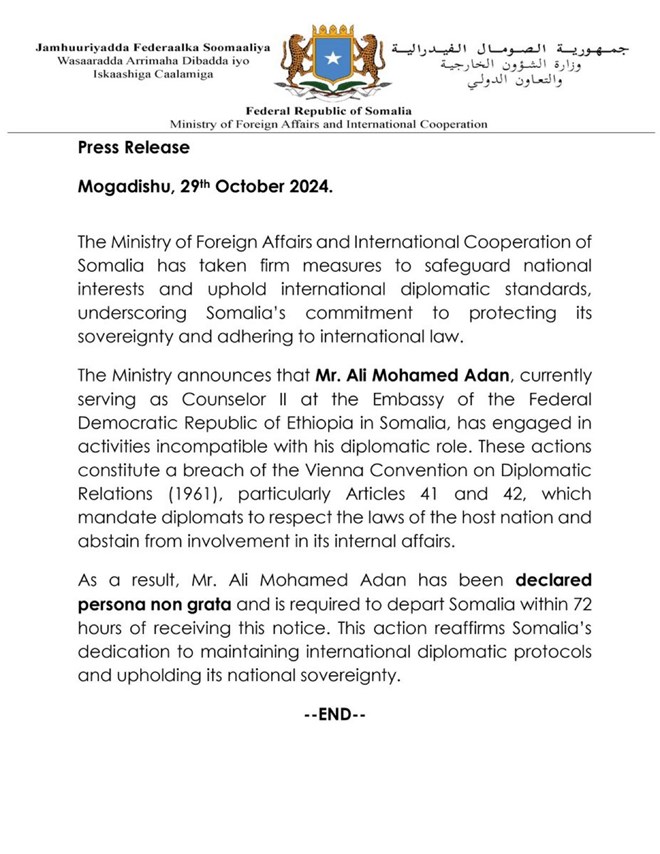
Tuesday October 29, 2024

Ali Mohamed Adan, known as "Ali Garre," the expelled Ethiopian diplomat accused by Somalia of intelligence activities incompatible with his diplomatic role. CREDIT: Supplied by SONNA
Mogadishu (HOL) — Somalia has expelled a senior Ethiopian diplomat, accusing him of activities “incompatible” with his diplomatic role and violating Somalia’s sovereignty, the Ministry of Foreign Affairs announced on Monday. Ali Mohamed Adan, who served as Counselor II at the Ethiopian Embassy in Mogadishu, was declared persona non grata and given 72 hours to leave the country. The expulsion marks a new peak in the strained relations between Somalia and Ethiopia, fueled by territorial disputes, shifting alliances, and Somalia’s renewed assertiveness over its internal affairs.
The Ministry of Foreign Affairs accused Adan of “engaging in activities incompatible with his diplomatic role.” The press release referenced the Vienna Convention on Diplomatic Relations (1961), highlighting Articles 41 and 42, which “mandate diplomats to respect the laws of the host nation and abstain from involvement in its internal affairs.” The Ministry stated this decision underscores Somalia’s commitment to “protecting its sovereignty and adhering to international law.”
A senior Somali official further alleged that Ali Mohamed Adan, known locally as “Ali Garre,” is suspected of being a colonel with Ethiopia’s military intelligence. The official claimed that Adan had used his diplomatic status as cover for covert operations, traveling across Somali regions on undisclosed missions. “Ali Garre’s presence here went beyond the scope of diplomacy,” the official remarked, emphasizing the seriousness of the allegations.
Ethiopia’s Ministry of Foreign Affairs has yet to respond to these accusations.
The decision to expel Adan follows a recent memorandum of understanding (MoU) signed between Ethiopia and Somaliland, Somalia’s northern region that has sought independence since the 1990s. The contentious agreement, which allegedly grants Ethiopia access to Somaliland’s Red Sea coast in return for potential recognition of Somaliland’s independence, has ignited tensions with Mogadishu, which sees the MoU as a violation of its territorial integrity. Somali officials argue that the deal threatens Somalia’s sovereignty and compromises Ethiopia’s neutrality as a peacekeeping partner.
In April, Somalia ousted Ethiopia’s ambassador and ordered the shuttering of its consulates in Somaliland and Puntland—two regions with aspirations for autonomy—over Addis Ababa's maneuvering for direct access to the Gulf of Aden.
Despite Somalia’s directives, Ethiopia’s consulates in Somaliland and Puntland remain operational. In May, Somaliland officials went as far as to claim that Ethiopia had upgraded its consulate in Hargeisa to full embassy status, though Ethiopia has not officially confirmed this. The symbolic laying of a foundation stone for Somaliland's new embassy in Addis Ababa in mid-October has amplified regional tensions. While celebrated by Somaliland as a significant diplomatic step, Ethiopia has remained conspicuously silent, neither confirming nor denying the embassy's establishment.
The relationship between Somalia and Ethiopia has been fraught with complexities, dating back to Ethiopia’s military intervention in Somalia in 2006. That intervention, intended to bolster Somalia’s then-Transitional Federal Government against insurgent groups, allowed Ethiopia to establish a significant presence in Somali affairs. To this day, Ethiopia’s Embassy remains within Villa Somalia, the presidential complex in Mogadishu — a potent symbol of Ethiopia’s influence. Somali officials have hinted at relocating the embassy in the future, underscoring their ambition to reclaim control over the nation’s political symbols and institutions.
The African Union’s upcoming peacekeeping mission in Somalia, set to replace AMISOM by year’s end, has prompted Mogadishu to demand the exclusion of Ethiopian forces. Somali leaders argue that Ethiopia’s recent actions undermine its neutrality, making it unsuitable for the new African Union Stabilization Mission in Somalia (AUSSOM). They emphasize that the mission should be composed of countries without conflicting interests, ensuring an unbiased peacekeeping presence that aligns with Somalia’s long-term security and development goals.
Egypt’s entry into the regional power dynamics has further complicated Somalia’s relations with Ethiopia. In recent months, Egypt has provided military aid to Somalia, a gesture widely interpreted as an attempt to counterbalance Ethiopia’s influence in the Horn of Africa. The longstanding Nile River dispute between Ethiopia and Egypt has stoked rivalry between the two nations. Egypt’s alliance with Somalia is seen by some as part of a broader strategy to check Ethiopian ambitions in the region.
Ethiopian officials have expressed concerns over Egypt’s involvement, viewing it as a threat to Ethiopia’s regional standing. Addis Ababa perceives Cairo’s support for Mogadishu as part of a larger campaign to undermine Ethiopian influence and gain strategic footholds in the Horn of Africa.
The growing tensions have alarmed international observers. In a recent United Nations Security Council session, U.S. representative Robert Wood urged both Somalia and Ethiopia to resolve their issues diplomatically, noting that prolonged discord could destabilize the Horn of Africa and jeopardize shared security interests. Acting UN special representative to Somalia, James Swan, echoed these sentiments, calling for adherence to international law and respect for national sovereignty.
At the same session, Somali Foreign Minister Ahmed Moalim Fiqi accused Ethiopia of using its counterterrorism presence in Somalia as a cover for territorial expansion. Fiqi claimed that Somali authorities had intercepted unauthorized arms shipments from Ethiopia, allegedly intended to fuel local conflicts. Ethiopian Foreign Minister Taye Atske-Selassie dismissed these accusations as unfounded, arguing that Ethiopia’s presence in Somalia is strictly focused on regional security and economic cooperation. Atske-Selassie suggested that Somalia’s allegations are a diversion from its own internal challenges.
The implications of Somalia’s move against Ethiopian influence may have far-reaching effects on regional alliances and power dynamics. For Somalia, the expulsion of Adan represents a step toward reasserting national sovereignty and redefining its role in the regional power landscape. As Somalia inches closer to transitioning from AMISOM to AUSSOM, the country sees this as an opportunity to limit foreign military influence from its neighbours and bolster its independence. Somali leaders argue that the new mission should reflect Somalia’s own security needs rather than the strategic agendas of bordering countries
